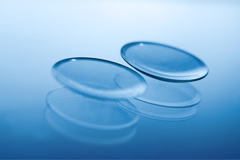Refractive
Eyeglasses
 Over 140 million people in the U.S. wear eyeglasses. Glasses improve vision by adjusting the way the eyes bend and focus light. Ideally, light rays are refracted (bent) as they pass through the cornea so that they focus on the retina in the back of the eye. In a healthy eye, this means that objects can be seen clearly. However, many people’s corneas have a shallow or steep curvature which causes light rays to focus in front of or behind the retina. Objects may then appear blurry at certain distances or at all distances.
Over 140 million people in the U.S. wear eyeglasses. Glasses improve vision by adjusting the way the eyes bend and focus light. Ideally, light rays are refracted (bent) as they pass through the cornea so that they focus on the retina in the back of the eye. In a healthy eye, this means that objects can be seen clearly. However, many people’s corneas have a shallow or steep curvature which causes light rays to focus in front of or behind the retina. Objects may then appear blurry at certain distances or at all distances.
Glasses correct these refractive errors. Prescriptions are measured for each eye so patients can enjoy optimal vision clarity, usually 20/20. Eyewear may be used for certain activities, such as reading for farsighted (hyperopic) patients and driving or watching television for nearsighted (myopic) patients, or may be worn at all times.
Regular eye exams test for the development and progression of refractive errors and help your optometrist provide a proper prescription if eyeglasses are needed. Exams are also an invaluable tool in the early detection of eye disease.
Contact Lenses
 Thanks to advances in optical technology, almost everyone can now wear contact lenses, regardless of the type or extent of their vision problems. That includes patients with astigmatism and those who need bifocal or multifocal lenses.
Thanks to advances in optical technology, almost everyone can now wear contact lenses, regardless of the type or extent of their vision problems. That includes patients with astigmatism and those who need bifocal or multifocal lenses.
Daily-wear Soft Contacts
Daily-wear soft contact lenses were the most popular type of contacts worn for may years. Made of a flexible plastic polymer, daily-wear lenses are put in each morning and taken out each night. They require a vigilant cleaning regimen and rest in a cleaning solution while you sleep. As it is easier to care for disposable lenses, and safer to throw lenses away as often as possible, these lenses are now generally prescribed for patients with less common refractive errors (patients for whom disposable lenses are unavailable or prohibitively expensive).
Extended-wear Soft Contacts
Extended-wear soft contact lenses can be worn all the time, including while you sleep. Depending on whether you have 7-day (standard) or 30-day lenses, you only need to take out and clean your contacts once a week or once a month. Extended-wear lenses are made of soft silicone that retains moisture longer than daily-wear contacts, allows more oxygen to reach the eye, and prevents bacteria and protein buildup. Although these lenses were approved for use, We believe they should not be worn overnight. While the oxygen transmissability may be ok, our experience demonstrates that patients who sleep in lenses – even these lenses – are more likely to develop sight threatening eye infections or become contact lens intolerent. Please, NEVER SLEEP IN YOUR CONTACT LENSES.
Disposable Lenses
Disposable soft lenses are intended to be thrown out and replaced after you’ve worn them for a certain length of time. This makes them even easier to maintain than regular soft contacts. Many disposable lenses are designed for replacement each morning, every two weeks, or even every three months. Disposables are worn during waking hours only.
Gas-permeable Lenses
Rigid, gas-permeable contacts offer several benefits over soft lenses. They:
- Can correct a wider range of vision problems, including a high degree of astigmatism;
- Provide sharper vision than most soft lenses;
- Allow more oxygen to pass through to the eye, reducing the risk of corneal irritation;
- Are more durable than soft lenses and don’t need to be replaced as often, lasting as long as two or three years.
Because they are much harder than flexible contacts, gas-permeable lenses may take some getting used to when you first start wearing them. They are also more likely than soft lenses to slip off the center of your eye and require adjustment, making them an inconvenient choice for patients who play sports or participate in other demanding activities. However, most patients soon grow accustomed to the feel of gas-permeable lenses and are satisfied with the improvement in vision they offer without the need for glasses.


